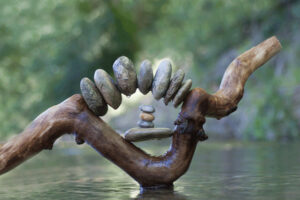(A version of this story originally appeared in Smoke Signals)
By Elizabeth Devereux
Where there is an open mind, there will always be a frontier.
~ Dorthea Brande
What if you could have less stress and more living through the practice of mindfulness?
Mindfulness is paying attention, on purpose and without judgment, in the present moment. Mindfulness allows us to move from one moment to the next with a sense of calm and mental clarity. Would your life be different if your experiences, from the mundane to the momentous, became opportunities to be more fully engaged, be more fully you?
Just like you train your body, mindfulness trains the brain. Practicing being purposely more aware changes your brain over time, a phenomenon science calls neuroplasticity. Studies show people who practice being more conscious have a greater sense of happiness, well-being and relaxation, while people who don’t, have more activity in the part of the brain associated with feelings of stress, anxiety and depression.
The great news is ongoing, enhanced awareness is portable; no meditation cushion or fancy techniques are required. For the more technologically inclined, though, there is the Mindfulness Bell App that rings periodically during the day to give you a chance to pause and notice what you’re currently doing and what state of mind you’re in while doing it.
In a mindfulness practice, we learn to ground our physical senses in real time, paying attention to body, breath, sight, sound, touch and taste and noticing what we can about what’s happening when it’s happening. Simple, though not easy, mindfulness is amazingly rewarding work—most likely why it’s becoming more and more mainstream.
It is interesting to consider the notion that how we do anything is how we do everything. Everyday “mindless” tasks can become ways to practice being more fully engaged: commuting to work; waiting in line or on hold; brushing teeth; chewing; doing the dishes.
What if a traffic jam, instead of being endured, became the perfect circumstance to notice how resistant and reactive thinking becomes chronically lodged as tension in the body and negatively colors your mood and perceptions? After practicing mindfulness exercises for several weeks, a student recently described bending down to tie her shoe and realizing, at that moment, how she moves through many motions of her day in a sort of “auto-pilot” mode.
Try a mindfulness experiment every day for a few weeks, and see if it doesn’t add to your life: Choose a mundane chore you do every day or alternate tasks, practicing awareness with several. For instance, when doing the dishes, feel the warmth of the water on your skin, see the craftsmanship of the dishes, hear the sounds of the bubbles and clinking of the silver, savor the lingering taste of the meal in your mouth, etc.
Whichever activity you choose, notice, without judgment, how many times your mind wanders away from observing all you can about the “textures” of your task, and gently draw your attention back, again and again—just like training a puppy, gently but firmly.
When we regularly train our attention to make the details of a task or activity the foreground, we can begin more easily to notice the habitual, discursive fluctuations of the mind in the background, “monkey mind” as it’s called in the biz. You might even begin to draw correlations with how mind states affect body states and moods and vice versa. Broadening your awareness, you might notice how that interplay influences your overall health, your relationships, the general enjoyment of your life, your spirit day to day.
Being mindful is a way of traveling, not a destination. Focusing on what actually IS in the present moment, without judgment, makes that moment come alive, infuses it with more nuanced, sacred, connected, naturally more informed beingness. String your present moments together with this expanded perspective approach, and you just may end up feeling like you’re having a richer, more openhearted, fully lived life.
Many people find it easier to meditate in a group with a guide, consider the eight-class Mindfulness Meditation series for experienced practitioners who like guidance and the support of a group; or for beginners curious about the benefits of meditation. On Tuesdays, at 4:15 p.m. March 7 – April 25 at the Wellness Center, with the option of participating via Zoom. Cost: $80 or $15 per class for drop-ins. Questions or registration: Elizabeth at (706) 579-0414 or peaceonearthinc@gmail.com.
Elizabeth Devereux’s work is a vibrant, transformative fusion of tools and processes for greater health, joy and possibility. She is well-known for her open-heartedness and keen ability to distill, synthesize and communicate ancient wisdoms and modern consciousness paradigms in a fun, relatable, effective way. Find out more at PeaceOnEarthINC.com.
The post How we do anything is how we do everything appeared first on Inside the Gates.
